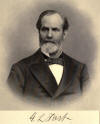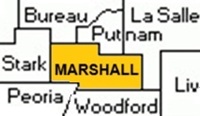
 Colonel
Greenbury L. FORT, of Lacon, who departed this life January 13,
1883, was for a long period a member of the Marshall county bar
and left the impress of his individuality, clear understanding
and masterful grasp of problems upon the law-making bodies of
state and nation. Time tests the merit of all things, and while
Colonel FORT in his modesty to a large degree shunned fame and
prominence, subsequent events have proven the clearness of his
conception and the breadth of his wisdom in regard to
legislative measures which have had direct and beneficial effect
upon the history of the country. A native of Ohio, he was born
in French Grant, Scioto county near Portsmouth, October 17,
1825, and was descended from a family which in its lineal and
collateral branches has been distinctively American through many
generations. His first ancestor in this country was Koger FORT,
born about 1675 at Pemberton, Burlington county, New Jersey.
There are now three distinct branches of the family in the
United States in New Jersey, Illinois and Georgia. Family
records show that a large percentage of the FORTs have been
professional men and that they have been represented in every
American war.
Colonel
Greenbury L. FORT, of Lacon, who departed this life January 13,
1883, was for a long period a member of the Marshall county bar
and left the impress of his individuality, clear understanding
and masterful grasp of problems upon the law-making bodies of
state and nation. Time tests the merit of all things, and while
Colonel FORT in his modesty to a large degree shunned fame and
prominence, subsequent events have proven the clearness of his
conception and the breadth of his wisdom in regard to
legislative measures which have had direct and beneficial effect
upon the history of the country. A native of Ohio, he was born
in French Grant, Scioto county near Portsmouth, October 17,
1825, and was descended from a family which in its lineal and
collateral branches has been distinctively American through many
generations. His first ancestor in this country was Koger FORT,
born about 1675 at Pemberton, Burlington county, New Jersey.
There are now three distinct branches of the family in the
United States in New Jersey, Illinois and Georgia. Family
records show that a large percentage of the FORTs have been
professional men and that they have been represented in every
American war.
In his early boyhood days Greenbury FORT accompanied his parents to Marshall county, Illinois, where the family home was established amid pioneer surroundings in April, 1834. He assisted in the arduous task of developing new land and improved the educational opportunities afforded him, supplementing a public school coarse by study in the Rock River Seminary. The years of his early manhood were devoted to teaching school and reading law, and following his admission to the bar in 1860 he presented his first brief in Woodford county court, where Senator David DAVIS was judge and Abraham LINCOLN the opposing counsel. His clientage soon became large and of a distinctively representative character. Thoroughness was ever one of his salient characteristics and was manifest in his preparation of a case and its presentation before the court.
Allied with the whig party from the time when age gave to him the right of franchise, he became a recognized leader in the ranks of the party and was first called to office in 1850 by election to the position of sheriff. He served successively as county clerk, county attorney and county judge being elected to the last named position in 1857 The following year he was married, on the 25th of May, to Miss Clara E. BOAL, a daughter of Dr. Robert BOAL, and entered upon a home life which was largely ideal.
He continued in practice until April, 1861, when he responded to the first call for volunteers enlisting for three months' service. He had been a close student of the momentous questions which led up to the outbreak of hostilities and his course was based upon well formulated opinions, resulting from a comprehensive understanding of the existing conditions. He was chosen lieutenant of Company B, Eleventh Illinois Volunteer Infantry and on the expiration of his term returned home and recruited another company, of which he was chosen captain. He took the men to the front at his own expense and entered active field service. Following the battle of Fort Donelson, in which he participated, he was appointed quartermaster by President LINCOLN, a position of great trust involving the success of movements in the field of the utmost importance. He served in the Army of the Tennessee on field and staff duty and was chief quartermaster of the Fifteenth Army Corps on the march to the sea. After the grand review in Washington he was ordered to Texas and remained in the service until mustered out at Galveston with the rank of colonel, in the spring of 1866.
Following his return home Colonel FORT resumed the practice of law, but was soon called again to public life, being elected to the Illinois state senate in 1866. In 1872 he was elected to congress, re-elected in 1874, in 1876 and 1878. Refusing longer to serve, he retired to private life. His most important public service was in connection with the solution of the resumption problem and to him was due the remonetization of silver. With a mind trained in the severest school of investigation and to which close reasoning had become habitual and easy, he took up the study of the money question and time has vindicated his position and proven his keen foresight.
Refusing to serve longer in the legislative halls of the nation he returned to his home in Lacon concentrating his energies upon his private business interests. He wisely placed his capital in the safest of all investments real estate and became the owner of farming interests in Marshall county and in Nebraska.
Perhaps one of the strongest traits of his character was his innate modesty and his freedom from all ostentation and display. Through his own, efforts he won success but was ever approachable and kindly, willing to accord to any one the courtesy of an interview. His acquaintance with men of national fame was great, yet he never sought their influence in his own behalf. His strength lay in his integrity and his known ability and willingness to help others. He was at once gentle and strong the gentleness of courtesy and culture, the strength of high purpose, honorable principles and fidelity. For more than thirty years he was prominent in the public life of his county state and nation and in the discharge of every duty entrusted to him displayed rare zeal, consummate ability, unwavering fidelity and sterling integrity which inspired universal confidence and respect. A fitting and deserved encomium is found in the words of Shakespeare:
"His life was gentle and the elements
So mixed in him that Nature might stand up
And say to all the world: 'This was a man.' "
Extracted July 2011 by Norma Hass from Past and Present of Marshall and Putnam Counties Illinois, 1907.
| Bureau Putnam La Salle | |||
| Stark |
 |
||
| Peoria | Woodford | ||

